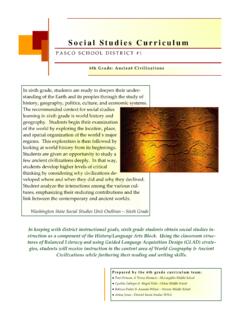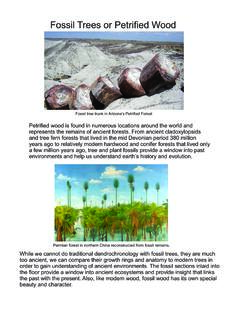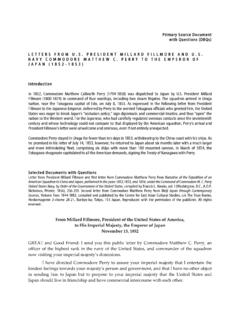Transcription of China: Democracy That Works
1 China: Democracy That Works The State Council Information Office of the People s Republic of China Contents Preamble I. Whole-Process People s Democracy Under CPC Leadership II. A Sound Institutional Framework III. Concrete and Pragmatic Practices IV. Democracy That Works V. A New Model of Democracy Conclusion 1 Preamble Democracy is a common value of humanity and an ideal that has always been cherished by the Communist Party of China (CPC) and the Chinese people. This year marks the centenary of the CPC. Since its founding in 1921, the Party has taken wellbeing for the Chinese people and the rejuvenation of the Chinese nation as its abiding goals, and has made continuous efforts to ensure the people s status as masters of the country.
2 China is a country with a feudal history dating back several thousand years that descended into a semi-feudal and semi-colonial society after the Opium War of 1840. Over the past hundred years, the Party has led the people in realizing people s Democracy in China. The Chinese people now truly hold in their hands their own future and that of society and the country. The people s status as masters of the country is the essence of people s Democracy . Since the 18th CPC National Congress in 2012, with a deeper understanding of China s path to Democracy and the political system, the Party has developed whole-process people s Democracy as a key concept and striven to translate it and relevant democratic values into effective institutions and concrete actions.
3 Whole-process people s Democracy integrates process-oriented Democracy with results-oriented Democracy , procedural Democracy with substantive Democracy , direct Democracy with indirect Democracy , and people s Democracy with the will of the state. It is a model of socialist Democracy that covers all aspects of the democratic process and all sectors of society. It is a true Democracy that Works . Democracy is a concrete phenomenon that is constantly evolving. Rooted in history, culture and tradition, it takes diverse forms and develops along the paths chosen by different peoples based on their exploration and innovation.
4 2 The best way to evaluate whether a country s political system is democratic and efficient is to observe whether the succession of its leaders is orderly and in line with the law, whether all the people can manage state and social affairs and economic and cultural undertakings in conformity with legal provisions, whether the public can express their requirements without hindrance, whether all sectors can efficiently participate in the country s political affairs, whether national decision-making can be conducted in a rational and democratic way, whether people of high caliber in all fields can be part of the national leadership and administrative systems through fair competition, whether the governing party is in charge of state affairs in accordance with the Constitution and the law, and whether the exercise of power can be kept under effective restraint and supervision.
5 Democracy is not a decorative ornament, but an instrument for addressing the issues that concern the people. Whether a country is democratic depends on whether its people are truly the masters of the country; whether the people have the right to vote, and more importantly, the right to participate extensively; whether they have been given verbal promises in elections, and more importantly, how many of these promises are fulfilled after elections; whether there are set political procedures and rules in state systems and laws, and more importantly, whether these systems and laws are truly enforced.
6 Whether the rules and procedures for the exercise of power are democratic, and more importantly, whether the exercise of power is genuinely subject to public scrutiny and checks. Democracy is the right of the people in every country, rather than the prerogative of a few nations. Whether a country is democratic should be judged by its people, not dictated by a handful of outsiders. Whether a country is democratic should be acknowledged by the international community, not arbitrarily decided by a few self-appointed judges. There is no fixed model of Democracy ; it manifests itself in many forms. Assessing the myriad political systems in the world against a single 3 yardstick and examining diverse political structures in monochrome are in themselves undemocratic.
7 In the richly diverse world, Democracy comes in many forms. China s Democracy is thriving alongside those of other countries in the garden of civilizations. China stands ready to contribute its experience and strength to global political progress through cooperation and mutual learning. 4 I. Whole-Process People s Democracy Under CPC Leadership China is a diligent and wise nation with a long history. It has created a brilliant political civilization. All of five thousand years ago, ancient Chinese began to explore the concept that people are the foundation of a state. Their ideas contained the seeds of what we know today as Democracy .
8 However, over the centuries of feudal autocracy, the people were always the oppressed and exploited underclass. After the 1840s, China gradually descended into a semi-feudal and semi-colonial society. There was no popular Democracy at all and the country was on the verge of collapse. The people stood up and fought to salvage their country. Revolution and reform were attempted, and many plans for saving the country were introduced, none of which succeeded. Following the Revolution of 1911, the Chinese people made numerous attempts to introduce the Western political systems, including the parliamentary system, multiparty system, and presidential system, all of which ended in failure.
9 The rise of the New Culture Movement championing Democracy and science, the victory of the October Revolution in Russia, the May 4th Movement, and the spread of Marxism in China, began to awaken the Chinese people, and progressive individuals gained a deeper understanding of Democracy and came up with new ideas. The founding of the CPC in 1921 was like a beacon, illuminating the way towards Democracy in China. During the New Democratic Revolution (1919-1949), the Party led the people in their tenacious fight for Democracy , resisting oppression and exploitation in the course of their struggle. Ultimately, victory was secured in the revolution.
10 5 On October 1, 1949, the People s Republic of China (PRC) was founded. This marked the ultimate transformation of the country from the rule of feudal autocracy, which had been in existence for several thousand years, to a people s Democracy . It proclaimed that the Chinese people had stood upright. It ushered in a new era for Democracy in China. It turned a dream into reality the people running their own country. During socialist revolution and reconstruction (1949-1978), the CPC united and led the people in: building and consolidating state power; completing the socialist transformation of the means of production; promulgating the first Constitution of the PRC; establishing the system of people s congresses, the system of CPC-led multiparty cooperation and political consultation, and the system of regional ethnic autonomy.





